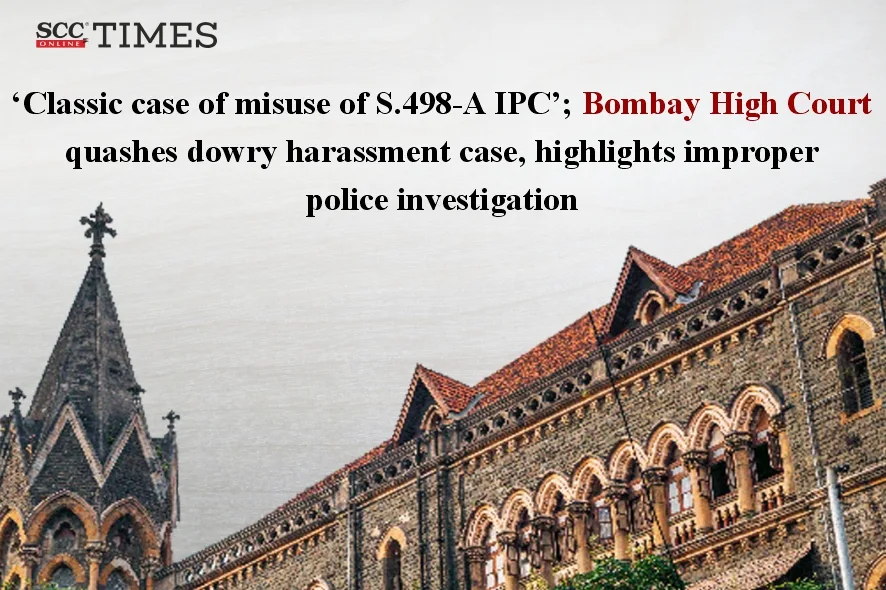Bombay High Court: An application was filed by Applicant 1 (‘husband’) and his family for the quashment of an FIR lodged against them in relation to a dowry harassment case instituted by Respondent 3 (‘wife’) under Sections 498-A, 323, 504 and 506 read with Section 34 of the Penal Code, 1860 (‘IPC’). The Division Bench of Vibha Kankanwadi* and Sanjay A. Deshmukh, JJ., observed that the wife was not able to prove the accusations and there were contradictions in her statements. Thus, the Court quashed and set aside the case against the husband and his family and flagged serious flaws in the police investigation, asserting that continued prosecution would amount to an abuse of the legal process.
Background:
The parties had an arranged marriage on 28-1-2024 and thereafter, the wife went to her parental home on 1-2-2024 and returned on 4-2-2024. The parties went to Manali on 12-2-2024 and returned on 17-2-2024 and later, the alleged desertion or driving her out of the house was stated to be on 28-3-2024, therefore, the wife had only resided for 40 days in the matrimonial house in Manmad.
The wife filed an FIR on 31-7-2024 under Sections 498-A, 323, 504 and 506 read with Section 34 IPC wherein she accused her husband, his father, mother, sister, brother-in-law as well as his cousin brother, of dowry harassment. She alleged that Rs 25 lakh was spent on the marriage and yet Rs 20 lakh was being demanded as dowry. Specific acts were attributed to each one of the applicants, which the wife claimed amounted to cruelty as defined in the explanation (a) or (b) to Section 498-A IPC. The wife stated that she was abused, asked to do the work in the house, and starved. Her sister-in-law was also accused of making a statement that the wife should be killed by pressing pillow on her face and that the husband’s second marriage should be performed. She also submitted that the duration of her stay was immaterial when the harassment was of great magnitude.
Analysis and Decision:
The Court observed that marriage stood on the footing of faith, feelings, and respect for each other. The Court took note of the fact that the wife was silent about her occupation as Medical Practitioner and she stated that her occupation was household which meant that she tried to project that she was not serving anywhere. The Court thus opined that in matrimonial disputes suppression of facts carried importance and hiding the fact of her own job was glaring and could be said to be with a mala fide intention.
The Court was surprised that within two days only the mother-in-law started demanding an amount of Rs 20 lakh as dowry. The Court observed that the applicants were well educated people and, therefore, it could not be believed that within two days the relationship became so bitter. The Court also noted that there was no specific role attributed to the father-in-law, the husband of sister-in-law, and the husband’s cousin.
The Court stated that the wife made it look like she and her husband were staying with her in-laws in Manmad after the marriage and even portrayed that her sister-in-law and her husband also lived nearby. The Court further noted that both the husband and the brother-in-law had private jobs and opined that it was hard to believe that for 40 days by leaving their job or not attending, they would have resided in Manmad. The Court therefore opined that it was easy to make allegations against others, but when it came to false allegations, they were hard to prove and called the present case a classic example of misuse of Section 498-A IPC. Further, it was also seen that the statements of the wife’s parents and brother were the same/copy paste.
The Court pulled up the police over their prejudiced approach when they took no efforts to visit the place and make an inquiry with the neighbouring persons as to the allegations of the acts of cruelty that took place at Khargar or Manmad. The Court observed that even the police did not take proper precautions and appropriate investigation when it came to offences under Section 498-A IPC and called their attitude of proceeding with investigation with presumptions/prejudicial mind, ‘dangerous’, as genuine cases would suffer due to such apathy.
Considering the previously mentioned factors, the Court exercised its powers under Section 482 of the Criminal Procedure Code, 1973 and quashed and set aside the criminal case against the husband and his family.
[Ajay Rajendra Khare v. State of Maharashtra, 2025 SCC OnLine Bom 2513, decided on 10-6-2025]
*Judgment authored by: Justice Vibha Kankanwadi.
Advocates who appeared in this case :
For the Applicants: Rashmi S. Kulkarni, Advocate
For the Defendants: A.R. Kale, APP for Respondents 1 and 2; M.M. Parghane, Advocate for Respondent 3.




Why no punishment is attributed to the police, they are the biggest culprits they make money from both parties in such cases nd court allows them to go scott free, making fun of of judicial system itself. Jai Hind